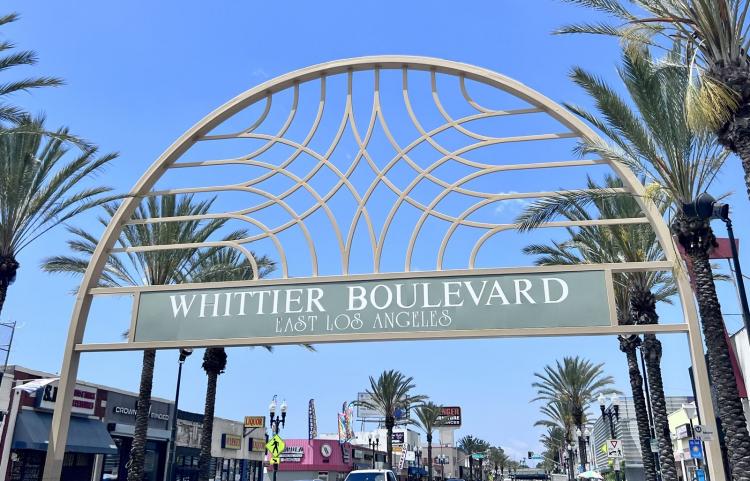AB 2986 (Carrillo) would establish a dedicated task force to study economic sustainability of East Los Angeles becoming a “special district” or its own city
- Judith Gutierrez
- (916) 319-2052

SACRAMENTO, CA - Assemblywoman Wendy Carrillo proposed Assembly Bill (AB) 2986, a feasibility study that would require the Local Agency Formation Commission for the County of Los Angeles (LALAFCO) to establish the East Los Angeles Task Force for the purposes of identifying and evaluating economic opportunities and potential impacts of becoming a “special district” or incorporating.
On Wednesday April 24, the policy received unanimous, bi-partisan support with an 8-0 vote after being presented in the Assembly Local Governments committee. On Friday, April 26, more than 150 residents attended a community meeting hosted by the East Los Angeles Chamber of Commerce in support of the policy.
“AB 2986 is simply a feasibility study that would allow East LA residents to have transparency in government by knowing where and how their tax dollars are being spent. For decades, East LA residents have been told they are “too poor and have no tax base.” Since LALAFCCO denied the last incorporation effort in 2012, we now ask the question, “what has been done since?” said Assemblywoman Wendy Carrillo. “To clear many misunderstandings about the policy, AB 2986 does not mandate cityhood for East Los Angeles, does not increase taxes nor does it change any of the current structure or county support for residents, it simply asks for transparency in government by allowing a study to move forward. Residents of East LA deserve transparency and accountability as to how their tax dollars are being spent and how they can be more involved and engaged in infrastructure projects, economic and workforce development, small businesses improvement and overall better the delivery of county services. If surrounding cities have local representation, why can’t East LA?”
“I am in support of AB 2986. As residents of an unincorporated area, we have no Mayor, City Council, or Governing Board, and our most ‘local’ elected official is our LA County Board Supervisor, who represents 2 million people,” said Kristie Hernandez, Chair of the Maravilla Community Advisory Committee in East Los Angeles. “Even with the Supervisor doing their best, it's a large district to cover, our community is made up of nearly 120,000 residents. East LA lacks a local voice solely representing our community’s interests, needs, and priorities. Without a governing body or any elected representative, we will continue to be excluded from critical decisions over county ordinances, including those related to housing and transportation planning and economic development.”
“With nearly 120,000 residents, East Los Angeles is the densest unincorporated area in the country,” said Isaias Hernandez, Executive Director of Eastmont Community Center in East Los Angeles. “Have you ever heard “all roads lead to Rome?” In Southern California, we say, “All roads lead to East Los Angeles.” With five highways traversing our community, East Los Angeles is surrounded and cut through by an extensive freeway system unlike anywhere else in Los Angeles County. It’s a vibrant community with economic drivers requiring strategic economic development policies that can only be realized in the long run through local control.”
Background: East Los Angeles is an unincorporated community in Los Angeles County. The community is 7.5 square miles (4,783 acres) in size and has a population of 118,786, 95.5% of whom are Latino. East Los Angeles is the most populous census-designated place (CDP) in California of the 1,136 CDPs and would be the 10th largest city of the 88 cities in Los Angeles County if incorporated. Yet, East Los Angeles is currently without a city council or mayor, and has limited influence over planning and economic development, revenue generated, public services, community beautification efforts and other aspects of daily quality of life issues.
Previous attempts to incorporate occurred in 1931, 1933, 1961, 1963, 1975 and 2012. The last time East LA residents were allowed to vote for the future of East LA was in 1975, nearly 50 years ago. Throughout the decades, several parts of East Los Angeles’ surrounding communities became small cities, and several East Los Angeles intuitions were given to new neighboring cities. In 1960, the area now known as the City of Commerce became a city and was given segments of East Los Angeles' industrial sites and large retailers, notably what is now the Commerce Center on Whittier Boulevard, taking away a large tax base from East Los Angeles. In 1972, portions of the surrounding areas around East Los Angeles Community College and the college itself were given to the City of Monterey Park, further reducing the potential revenue and tax base of East Los Angeles.
Cities neighboring East Los Angeles with smaller populations with a City Council and Mayor include:
Alhambra: 80,259 Montebello: 60,569
Monterey Park: 58,554 Commerce: 11,828
Cudahy: 21,969 Maywood: 24,122
In 2012, following a four-year campaign to incorporate, the effort was rejected by LALAFCO and LA County, and residents were denied the opportunity to vote on the issue in this new era. At the time, residents of East Los Angeles were promised annual financial disclosure reports to see how their tax dollars were being used and their tax base towards improving the community. That commitment has never been fulfilled.
To add your support to the bill, click here.
###
About Assemblywoman Wendy Carrillo
Assemblywoman Carrillo was elected to serve in the State Assembly in December 2017. She represents the 52nd Assembly District, which includes East Los Angeles, the City of Los Angeles, and South Glendale. She serves on the Assembly Committees on Appropriations, Emergency Management, Health, Labor and Employment, and the Joint Committee on Climate Change Policies. She also serves as the Chair of the Select Committee on Latina Inequities, Vice Chair of the Legislative Progressive Caucus, Commissioner for the California Film Commission, Commissioner for the Mental Health Services Oversight and Accountability Commission, and Member of the California Cultural and Historical Endowment Board.